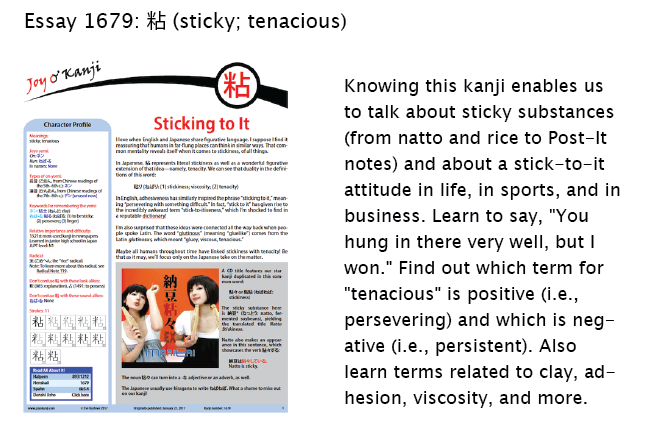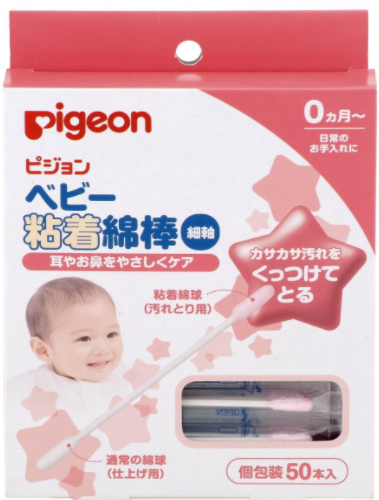Konfusion
Today I'll share a random assortment of words that have confused me in recent days. For some reason, almost all begin with k!
1. Kakeru
If 鼻 means "nose," what do you think this term could mean:
鼻にかける (はなにかける)
a. to blow one's nose
b. to lie
c. to boast
d. to meddle
What's happening to the nose?! I'll block the answer with a preview of the newest essay:

c. 鼻にかける (はなにかける) means "to boast." The かける corresponds to 掛ける, but unfortunately dictionaries don't indicate the meaning of the verb here, so we'll have to go with the most common definition, "to hang." Someone boasts that his nose hangs from his face?! Either he has an exceptionally long nose or he'll brag about absolutely anything!
I find 掛ける to be one of the most confusing verbs out there, as its meaning keeps changing with context. For instance, the following phrase appears in essay 2023 on 摯 (serious, sincere):
ミシンを掛ける (ミシンをかける: to sew with a sewing machine)
This 掛ける means "to use a machine"! Here are two more examples of that ilk:
掃除機を掛ける (そうじきをかける: to vacuum)
vacuum cleaner (1st 3 kanji) + to use a machine
アイロンを掛ける (アイロンをかける: to iron)
2. Kome
This week I posted Radical Note 119 on 米 (こめ), the "rice" radical, and in the process I learned two things.
First, in Internet slang, people use 米 to stand for コメ, which in turn is an abbreviation for コメント (comment). The title of a video (about an international videogame tournament) starts with 米付き (こめつき), which means "with comments." Japanese writing flows freely across the video in a very distracting way.
Second, if you want to type the symbol ※, just input こめ, and ※ will appear in the list of choices. The Japanese use this symbol to draw attention to certain bits of text. This week I came across ※ in a label on a bottle of alcohol. The symbol preceded a warning that translated this way: "Adding ice detracts from the flavor. Please be extra-cautious!"
3. Kriticism
This week the leader of an important country made a fool of himself and became the butt of everyone's jokes. I'm talking, of course, about Prime Minister Abe, who read a speech and pronounced one word as でんでん, when no such word exists. Most likely, this is the term he saw (minus the helpful yomi!):
云々 or 云云 (うんぬん: (1) and so on, etc., and such, and the like; (2) comment; criticism)
This kanji (which means "to say") is non-Joyo. Could that be the problem? He probably never learned this character in school. But I've seen it scads of times because 云う is an alternate way of rendering 言う (いう: to say), so surely he too must have encountered 云 over the years!
No matter what his history, how could he be reading along and utter a word that made no sense? Was he spaced out and not paying the slightest attention to his own comments?
I'm amused that 云々 can also mean “criticism,” which was the very topic of his comment. (In his speech, he addressed lawmakers and said, "Nothing good comes if all you do is criticize.") Well, that backfired! Criticism definitely ensued after his blunder!
4. Kukkiri, Kasakasa, and Kuttsukeru
Although I can't understand how Abe's mind was working there, he somewhat has my sympathy, in that I'm forever astounded by how hard Japanese is. The newest essay includes these two images:


The first product is clay, and this phrase appears on the packaging:
手相までくっきり~!
It's so hard to make sense of this! What is the 相 doing there? And what's the last word?
The second product is a special kind of cotton swab, and the packaging features this phrase:
カサカサ汚れをくっつけてとる
I recognize 汚れ (dirt), and that's about it! In both phrases, those damn k words are causing all the trouble! Well, so is 相!
Here's the scoop:
手相までくっきり~!
Even the lines of your palm will be visible (in the hand print)!
手相 (てそう: lines on one’s palm, esp. those used for fortune telling); くっきり ((standing out) distinctly)
カサカサ汚れをくっつけてとる
Attaches to dry earwax and removes it
カサカサ (dryness); 汚れ (よごれ: dirt, referring here to earwax); くっつける (くっ付ける: to attach); とる (取る: to remove)
About those k words, くっきり is a mimetic term (that is, an onomatopoeia-like word for something without actual sounds), カサカサ is onomatopoeia, and くっつける starts with くっ-, which (according to Nihon Kokugo Dai-Jiten) may be a phonetically altered version of くい (食い).
Incidentally, Halpern says that the 相 in 手相 means "physiognomy." Okay, that doesn't help much. It sounds like "physiology," and indeed 相 appears in 骨相 (こっそう: physique), but the same character also plays a role in 家相 (かそう), which Halpern defines as "physiognomy of a house." What the hell?!
Okay, deep breaths! One dictionary defines "physiognomy" as follows: "the outward appearance of anything, taken as offering some insight into its character." Ooh, I like the sound of that! Total change of bad mood! So the 相 in 手相 means "how the hand looks" and, more specifically, what all those lines mean! Pretty cool! In fact, this idea fits into a bigger context; my proofreader says that 相-related terms such as 手相, 家相, and others are about fortune telling. So the way a hand or house looks isn't just a matter of subjective aesthetics. Rather, there's a system of interpreting their appearances.
Otherwise, 相 can mean anything from "phase" to "mutual" to "minister," as in these words:
世相 (せそう: phase of life; social conditions)
相互 (そうご: mutual, reciprocal)
首相 (しゅしょう: prime minister)
That slipsiding meaning recalls 掛ける, and 首相 brings us back to Abe and his impossible language. However, with "physiognomy," English just gave Japanese a run for its money!
As long as we're talking about linguistic struggles, I want to share a beautiful passage I just read. It comes from Jhumpa Lahiri's story "Interpreter of Maladies" in a collection of the same name. A character once wanted to master many languages, but he settled long ago for degrading jobs, such as driving tourists around. As he falls in love with one passenger and imagines that his feelings could be reciprocated, his mind begins to race:
It was similar to a feeling he used to experience long ago when, after months of translating with the aid of a dictionary, he would finally read a passage from a French novel, or an Italian sonnet, and understand the words, one after another, unencumbered by his own efforts. In those moments Mr. Kapasi used to believe that all was right with the world, that all struggles were rewarded, that all of life's mistakes made sense in the end.
Ah! How well described! And how perfectly it applies to reading Japanese! Imagine that—to understand the words, one after another, unencumbered by one's own efforts, all the struggles rewarded. What a thing that would be! Someday ...
Have a great weekend!

Comments